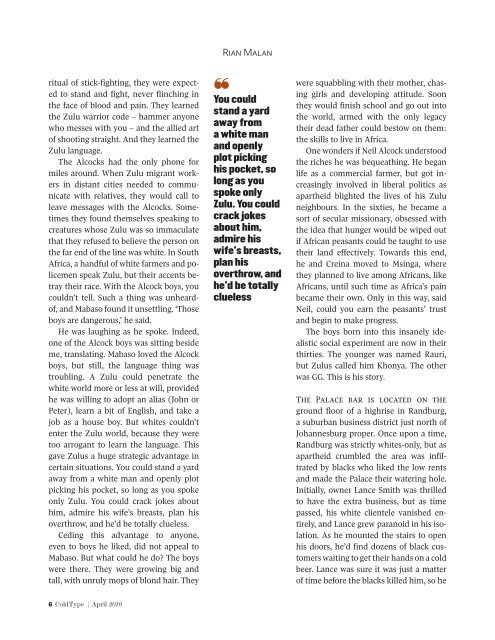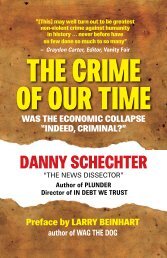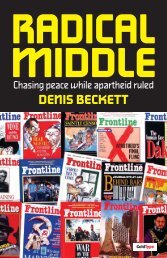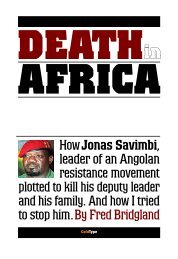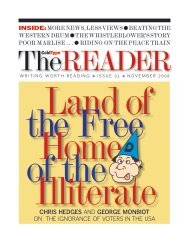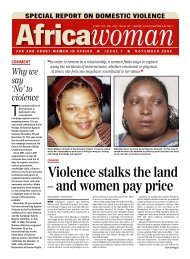You also want an ePaper? Increase the reach of your titles
YUMPU automatically turns print PDFs into web optimized ePapers that Google loves.
itual of stick-fighting, they were expected<br />
to stand and fight, never flinching in<br />
the face of blood and pain. They learned<br />
the Zulu warrior code – hammer anyone<br />
who messes with you – and the allied art<br />
of shooting straight. And they learned the<br />
Zulu language.<br />
The Alcocks had the only phone for<br />
miles around. When Zulu migrant workers<br />
in distant cities needed to communicate<br />
with relatives, they would call to<br />
leave messages with the Alcocks. Sometimes<br />
they found themselves speaking to<br />
creatures whose Zulu was so immaculate<br />
that they refused to believe the person on<br />
the far end of the line was white. In South<br />
Africa, a handful of white farmers and policemen<br />
speak Zulu, but their accents betray<br />
their race. With the Alcock boys, you<br />
couldn’t tell. Such a thing was unheardof,<br />
and Mabaso found it unsettling. ‘Those<br />
boys are dangerous,’ he said.<br />
He was laughing as he spoke. Indeed,<br />
one of the Alcock boys was sitting beside<br />
me, translating. Mabaso loved the Alcock<br />
boys, but still, the language thing was<br />
troubling. A Zulu could penetrate the<br />
white world more or less at will, provided<br />
he was willing to adopt an alias (John or<br />
Peter), learn a bit of English, and take a<br />
job as a house boy. But whites couldn’t<br />
enter the Zulu world, because they were<br />
too arrogant to learn the language. This<br />
gave Zulus a huge strategic advantage in<br />
certain situations. You could stand a yard<br />
away from a white man and openly plot<br />
picking his pocket, so long as you spoke<br />
only Zulu. You could crack jokes about<br />
him, admire his wife’s breasts, plan his<br />
overthrow, and he’d be totally clueless.<br />
Ceding this advantage to anyone,<br />
even to boys he liked, did not appeal to<br />
Mabaso. But what could he do? The boys<br />
were there. They were growing big and<br />
tall, with unruly mops of blond hair. They<br />
6 <strong>ColdType</strong> | April 2010<br />
Rian Malan<br />
❝<br />
you could<br />
stand a yard<br />
away from<br />
a white man<br />
and openly<br />
plot picking<br />
his pocket, so<br />
long as you<br />
spoke only<br />
Zulu. you could<br />
crack jokes<br />
about him,<br />
admire his<br />
wife’s breasts,<br />
plan his<br />
overthrow, and<br />
he’d be totally<br />
clueless<br />
were squabbling with their mother, chasing<br />
girls and developing attitude. Soon<br />
they would finish school and go out into<br />
the world, armed with the only legacy<br />
their dead father could bestow on them:<br />
the skills to live in Africa.<br />
One wonders if Neil Alcock understood<br />
the riches he was bequeathing. He began<br />
life as a commercial farmer, but got increasingly<br />
involved in liberal politics as<br />
apartheid blighted the lives of his Zulu<br />
neighbours. In the sixties, he became a<br />
sort of secular missionary, obsessed with<br />
the idea that hunger would be wiped out<br />
if African peasants could be taught to use<br />
their land effectively. Towards this end,<br />
he and Creina moved to Msinga, where<br />
they planned to live among Africans, like<br />
Africans, until such time as Africa’s pain<br />
became their own. Only in this way, said<br />
Neil, could you earn the peasants’ trust<br />
and begin to make progress.<br />
The boys born into this insanely idealistic<br />
social experiment are now in their<br />
thirties. The younger was named Rauri,<br />
but Zulus called him Khonya. The other<br />
was GG. This is his story.<br />
The Palace bar is located on the<br />
ground floor of a highrise in Randburg,<br />
a suburban business district just north of<br />
Johannesburg proper. Once upon a time,<br />
Randburg was strictly whites-only, but as<br />
apartheid crumbled the area was infiltrated<br />
by blacks who liked the low rents<br />
and made the Palace their watering hole.<br />
Initially, owner Lance Smith was thrilled<br />
to have the extra business, but as time<br />
passed, his white clientele vanished entirely,<br />
and Lance grew paranoid in his isolation.<br />
As he mounted the stairs to open<br />
his doors, he’d find dozens of black customers<br />
waiting to get their hands on a cold<br />
beer. Lance was sure it was just a matter<br />
of time before the blacks killed him, so he


